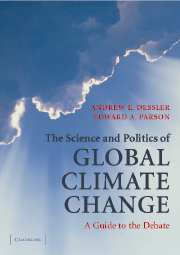Book contents
- Frontmatter
- Contents
- Preface
- 1 Global climate change: a new type of environmental problem
- 2 Science, politics, and science in politics
- 3 Climate change: present scientific knowledge and uncertainties
- 4 The climate-change policy debate: impacts and potential responses
- 5 The present impasse and steps forward
- Appendix
- Glossary
- References
- Index
- References
5 - The present impasse and steps forward
- Frontmatter
- Contents
- Preface
- 1 Global climate change: a new type of environmental problem
- 2 Science, politics, and science in politics
- 3 Climate change: present scientific knowledge and uncertainties
- 4 The climate-change policy debate: impacts and potential responses
- 5 The present impasse and steps forward
- Appendix
- Glossary
- References
- Index
- References
Summary
In the previous chapters, we have summarized the present state of knowledge and uncertainty on climate change. We have reviewed what is known about the climate and how it is changing, the evidence for a human contribution to the observed changes, and the range of potential changes projected for the coming century, as well as the weaker state of knowledge about potential climate-change impacts and responses. This final chapter is more political, in two senses. First, we present a detailed examination of the present deadlocked politics of the issue, reviewing both who is lining up where, and what arguments are being advanced that are contributing to the current deadlock. Second, we present our own judgments of what kind of response to the climate issue appears to be appropriate, prudent, and practical in view of present scientific knowledge and political alignments.
Climate-change politics: present positions
Although climate change has been on policy agendas for more than a decade, progress on the issue is stalled both domestically in the United States of America and internationally. As discussed in Chapter 4, there are several broad types of response to the climate issue, including mitigation (reducing emissions), adaptation, and geoengineering. But present controversy, and the present deadlock in policy-making, are nearly exclusively concerned with mitigation – whether to take near-term policy action to reduce emissions, and if so, how stringently and of what form.
- Type
- Chapter
- Information
- The Science and Politics of Global Climate ChangeA Guide to the Debate, pp. 128 - 179Publisher: Cambridge University PressPrint publication year: 2005



